12 Best PPC Keyword Research Tools for 2025 (Top Picks)
12 Best PPC Keyword Research Tools for 2025 (Top Picks)
Running a PPC campaign without the right keywords is like throwing money into a black hole. You know the goal is to find those high-intent, low-cost gems, but sifting through endless search term reports feels like a total chore, right? That’s where the magic of specialized PPC keyword research tools comes in.
They don’t just spit out a list of terms; they reveal what your competitors are bidding on, uncover hidden long-tail opportunities, and give you the data to make smarter budget decisions. It’s all about working smarter, not harder. To truly stop guessing and find winning keywords, it's beneficial to understand more advanced techniques, such as various NLP methods for social media keyword analysis, which can uncover intent in ways traditional data can't.
In this guide, we're cutting through the noise to bring you the 12 best tools that will streamline your workflow, slash wasted ad spend, and ultimately, supercharge your campaign's ROI. We’re diving deep into the platforms that seasoned pros actually use, from all-in-one powerhouses to the must-have freebies.
Forget generic feature lists. For each tool, we’ll provide a practical breakdown covering:
- Key Features & Use Cases: What it does best and when to use it.
- Pricing: A clear overview of the costs involved.
- Pros & Cons: An honest look at strengths and weaknesses.
- Best For: Who will get the most value from each platform.
We've included direct links and screenshots for every tool, so you can see them in action. Let's find the platform that will turn your campaigns into conversion machines.
1. Keywordme
Keywordme stands out as a powerful and uniquely integrated PPC keyword research tool designed specifically to supercharge your Google Ads workflow. Instead of being a separate platform you have to juggle, it operates as an intuitive Chrome plugin directly within the Google Ads interface. This fundamental difference is its greatest strength, transforming tedious, manual keyword management into a streamlined, one-click process.
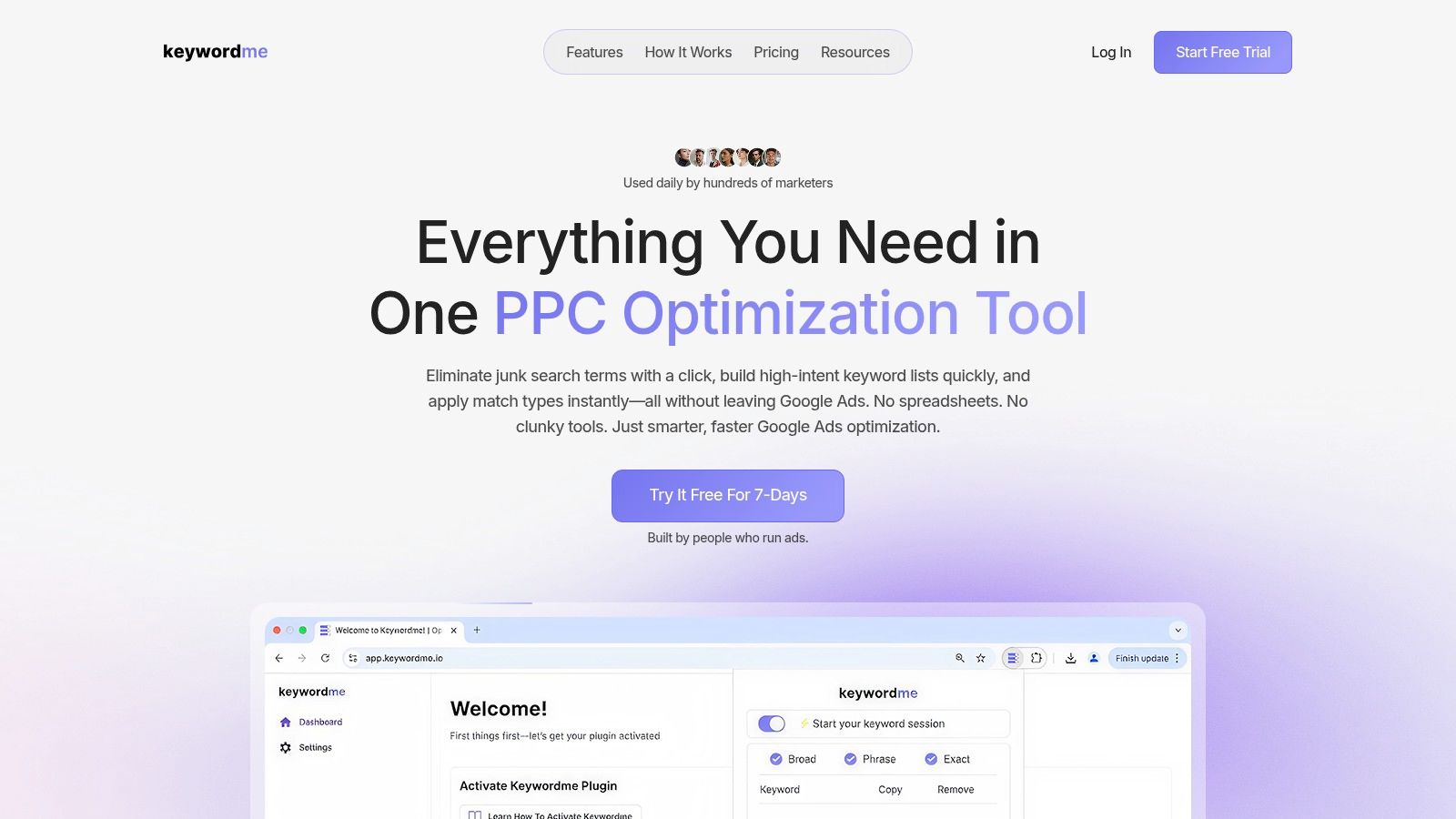
The tool excels at turning raw search term data into actionable campaign assets. You can instantly add converting search terms as new keywords with the correct match type (exact, phrase, or broad) or add irrelevant "junk" terms to your negative keyword lists in bulk. This eliminates the need for cumbersome spreadsheets and endless copy-pasting, accelerating optimization workflows by up to 10 times.
Key Strengths & Use Cases
Keywordme is built for efficiency, making it a must-have for anyone serious about cutting wasted ad spend and maximizing ROI. Its core value lies in its ability to handle bulk actions effortlessly, saving hours of manual labor each week.
- Best For: PPC managers, digital marketing agencies, and freelance specialists who spend significant time refining keyword lists and analyzing search term reports.
- Practical Use Case: Imagine reviewing a search term report with hundreds of entries. With Keywordme, you can scan the list and, with a single click, add 50 terms to your negative list and simultaneously create 20 new exact-match keywords in the appropriate ad group, all without leaving the Google Ads screen.
- Pro Tip: Use the tool to build out new campaigns or ad groups based on proven, high-performing search terms from existing campaigns. This data-driven approach ensures your expansion efforts are grounded in what already works for your audience. For a deeper dive, you can learn more about how to automate keyword research on Keywordme.io.
Website: https://www.keywordme.io
2. Google Ads Keyword Planner
No list of PPC keyword research tools would be complete without the OG: Google Ads Keyword Planner. This is Google's own free tool, built directly into the Google Ads platform. It's the baseline for many advertisers, providing keyword ideas, search volume data, and cost estimates straight from the source. It’s the perfect starting point for anyone building a campaign from scratch.
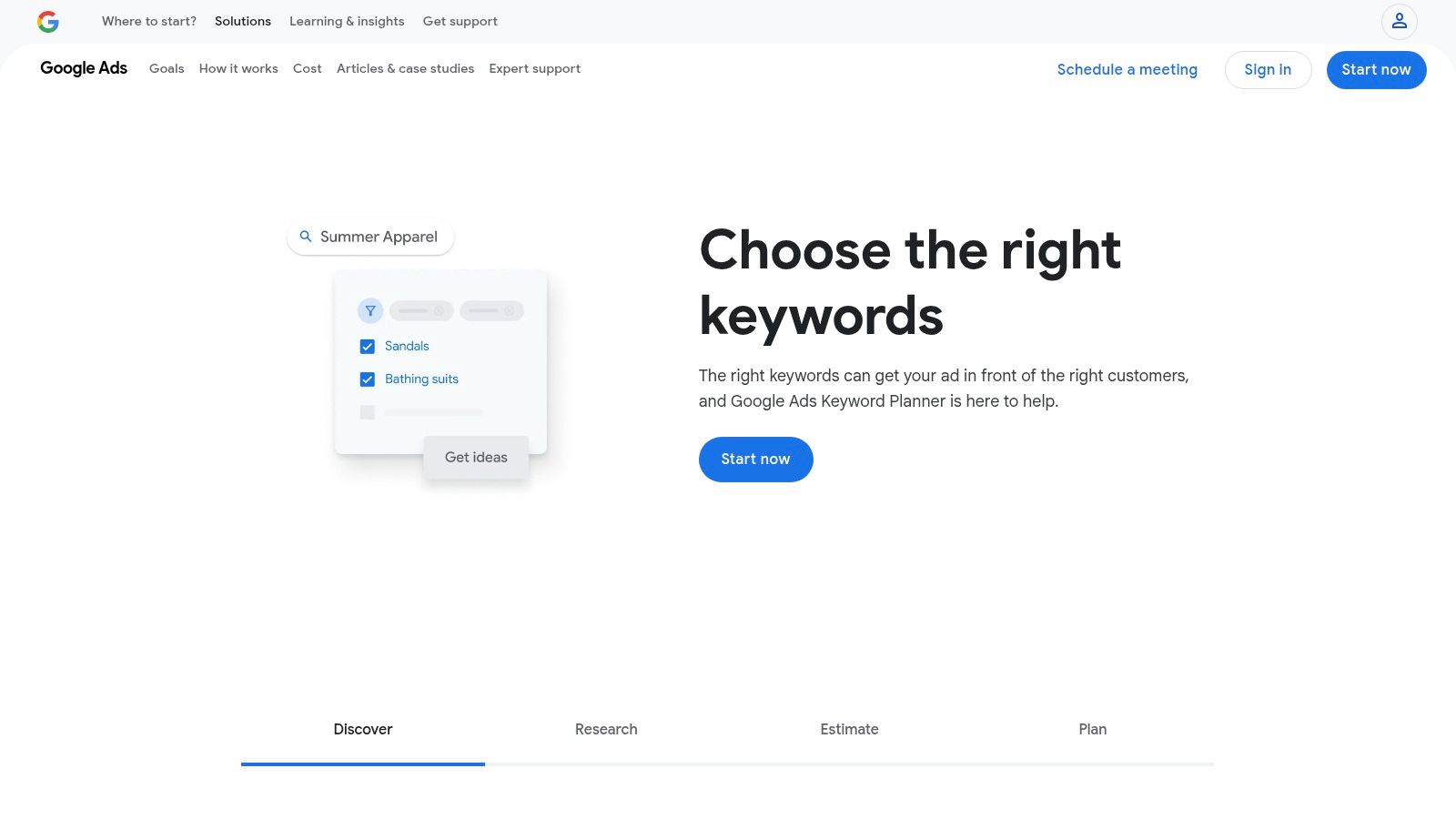
Its biggest advantage is its seamless integration. You can discover new keywords by plugging in a few seed terms or even a competitor’s URL, and then directly add your chosen terms into a new or existing campaign plan. This workflow eliminates the clunky process of exporting and importing keyword lists. For those looking to expand their reach, understanding how to leverage the platform is key. Find more insights on mastering Google Ads for business growth.
Best Features & Use Cases
- Discover New Keywords: Get suggestions based on your core products, services, or even a competitor's landing page.
- Get Search Volume and Forecasts: See historical metrics like average monthly searches and competition level. You can also forecast potential clicks and costs for your keyword list.
- Direct Campaign Integration: Build a keyword plan and push it directly into a new campaign without ever leaving the platform. This makes it one of the most efficient PPC keyword research tools for campaign setup.
Pro Tip: For the most accurate data, you need an active Google Ads account with some spend history. New or low-spend accounts often see broad search volume ranges (e.g., "1K-10K") instead of precise numbers. You can discover how to use the Google Ads Keyword Planner effectively on keywordme.io.
3. Microsoft Advertising Keyword Planner
While Google dominates the search engine market, ignoring Bing means missing out on a valuable, often less competitive, segment of the audience. Microsoft Advertising Keyword Planner is the essential, free tool for tapping into this network. Built directly into the Microsoft Ads platform, it provides keyword ideas, search volume data, and cost estimates specifically for Bing, Yahoo, and AOL search traffic.
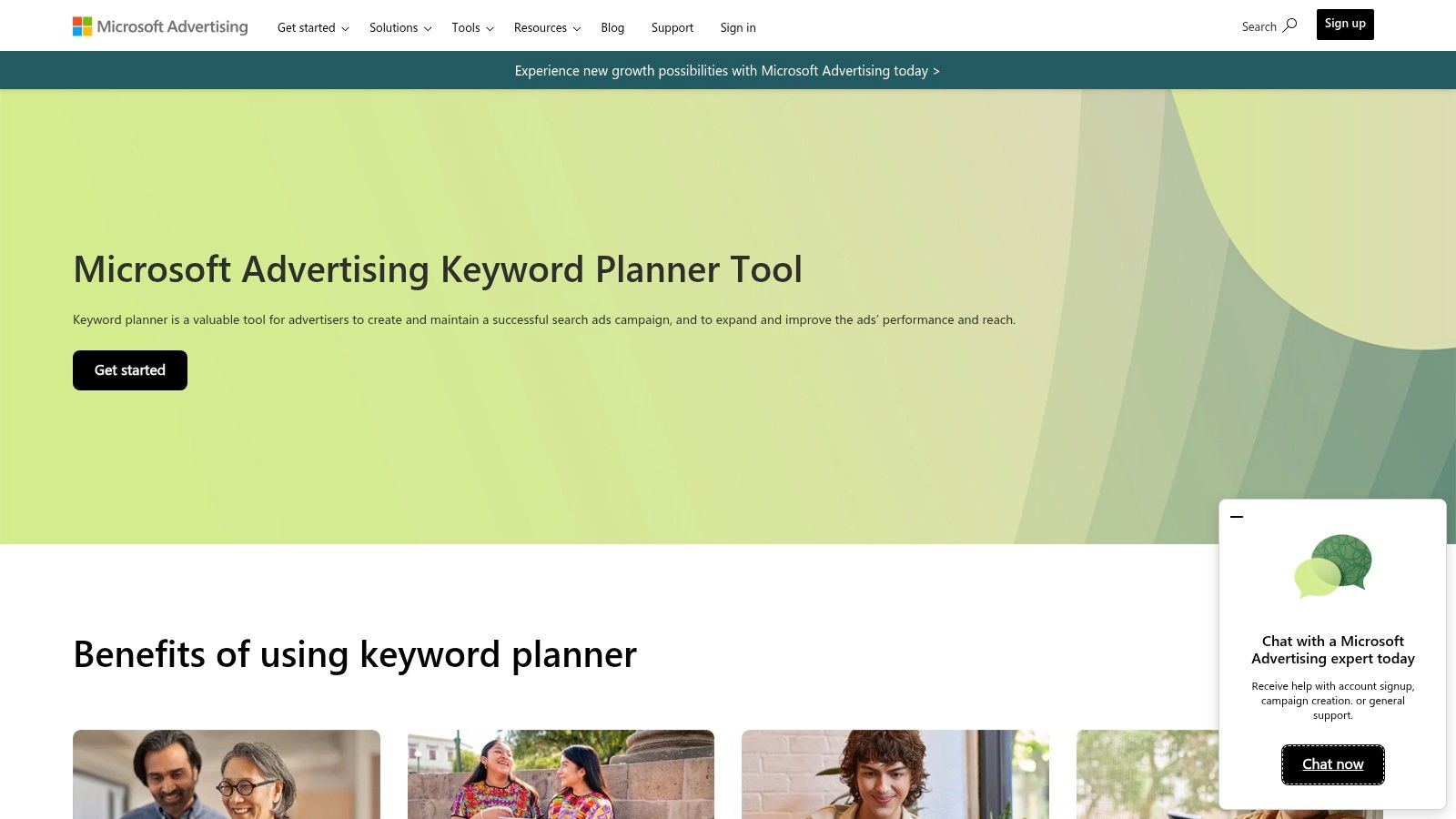
Its primary advantage is providing data you can't get from Google-centric tools. The search behavior and demographics on the Microsoft Search Network can differ significantly, often skewed towards an older and more affluent user base. This planner lets you validate keyword opportunities and build campaigns tailored to this unique inventory, making it an indispensable part of a diversified PPC strategy. Access is free, but it does require an active Microsoft Advertising account to use.
Best Features & Use Cases
- Find New Keywords: Uncover search terms and get suggestions based on Bing’s unique data, providing insights you won't find in other tools.
- Granular Geo-Targeting: Dive deep into location-based data, with options to target by city, DMA, state, and even plan for cross-border campaigns.
- Microsoft Search Network Data: Access performance forecasts, trends, and CPC estimates sourced directly from Bing, ensuring your campaign planning is accurate for the platform.
Pro Tip: Don't just copy-paste your Google Ads keyword list into Bing. Use the Microsoft Advertising Keyword Planner to identify "hidden gem" keywords that have high volume on Bing but lower competition and cost compared to Google. You can find unique opportunities your competitors might be overlooking.
4. Semrush – Keyword Magic Tool
Semrush's Keyword Magic Tool is an absolute powerhouse, widely respected for its massive keyword database and robust filtering capabilities. While it's a favorite among SEOs, its features make it one of the most versatile PPC keyword research tools available. It provides a comprehensive suite of data, blending search volume and CPC with advanced competitive metrics, allowing you to build highly structured campaigns with precision.
What makes it stand out is its ability to organize chaos. Starting with a single seed keyword, you can instantly generate thousands of suggestions, then use its powerful filters to group them by topic, match type, or even user intent. This makes building tightly-themed ad groups incredibly fast and efficient, moving beyond simple keyword lists to a more strategic campaign structure. While it comes with a subscription cost, the depth of data and time saved often justify the investment for serious advertisers. You can learn more about its features on the Semrush website.
Best Features & Use Cases
- Extensive Keyword Database: Gain access to over 27 billion keywords across more than 140 geographical databases, ensuring you find every relevant opportunity.
- Advanced Filtering and Clustering: Group keywords by topic, search intent, questions, and match type to quickly build organized ad groups. Its AI-driven clustering is a major time-saver.
- Competitive PPC Metrics: Analyze CPC distribution, keyword difficulty, and competitive density to evaluate which keywords are worth bidding on and which to avoid.
Pro Tip: Use the "Related" and "Questions" filters to uncover long-tail keywords perfect for creating targeted ad copy and landing page content that speaks directly to user queries. This helps improve Quality Score and conversion rates.
5. Ahrefs – Keywords Explorer
While many know Ahrefs for its powerful SEO capabilities, its Keywords Explorer is a beast for PPC research too. It stands out by providing deep contextual data that goes beyond simple search volume. By offering a comprehensive look at the SERP, ad history, and true traffic potential of a keyword, Ahrefs helps you understand the entire competitive landscape before you spend a single dollar on ads. It's an indispensable tool for marketers who value data-driven decisions for both their organic and paid strategies.
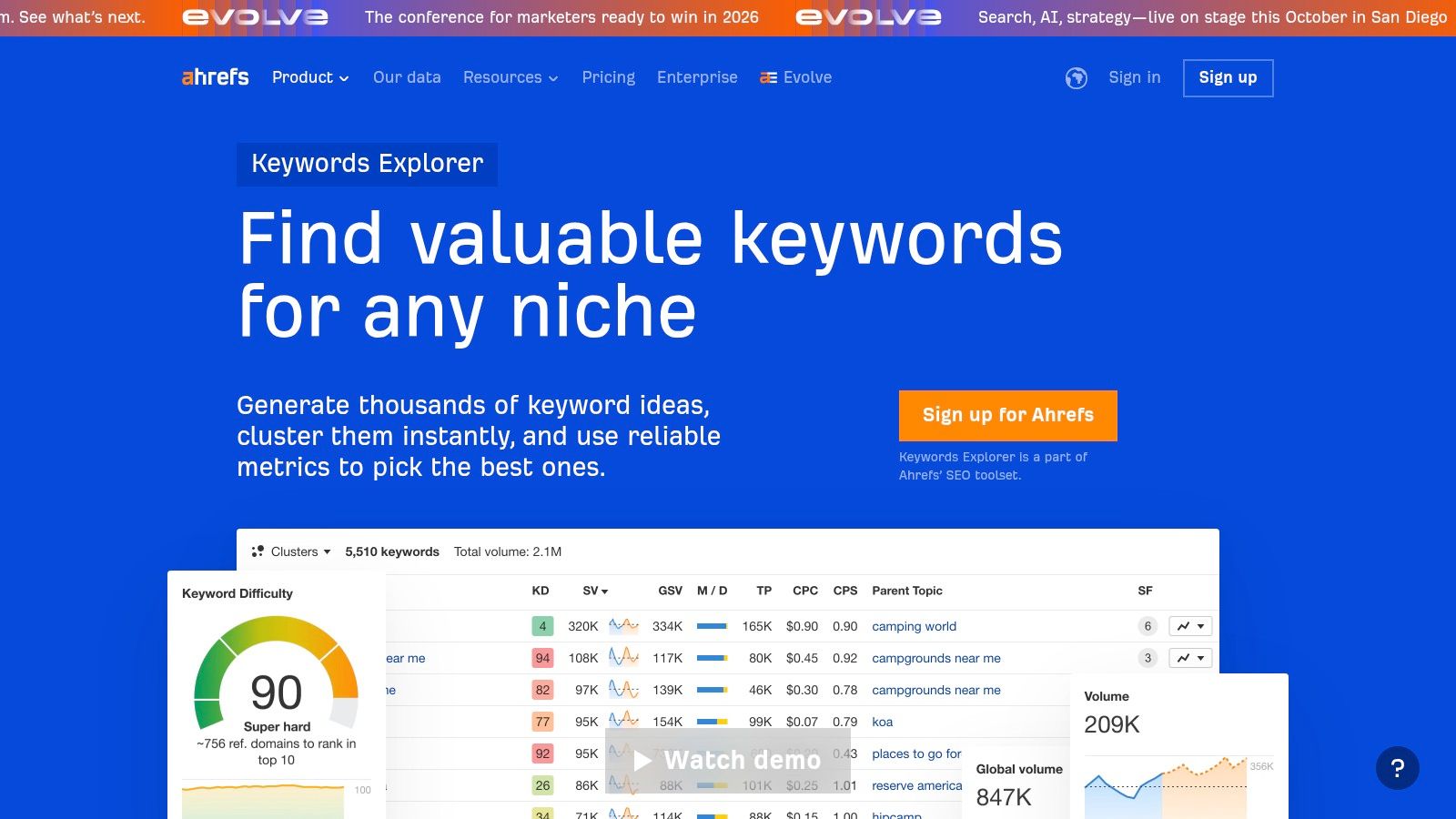
Ahrefs’ main advantage lies in its historical data and holistic view. You can see which competitors have bid on a term in the past and even view their ad copy for inspiration. The "Traffic Potential" metric is also a game-changer, estimating the total traffic you could get from a keyword if you ranked #1, which is far more insightful than just looking at search volume. Full access requires a paid subscription, with plans starting at a higher price point, making it a better fit for agencies or businesses with a dedicated marketing budget.
Best Features & Use Cases
- Ads Position History: See a historical timeline of domains that have advertised on a keyword and the exact ad copy they used.
- Traffic Potential Metric: Understand the real traffic opportunity of a keyword beyond its monthly search volume, helping you prioritize high-impact terms.
- Advanced Filtering: Sift through a massive database of over 28 billion keywords with powerful filters to pinpoint the perfect terms for your campaigns. Ahrefs is one of the most robust ppc keyword research tools for granular analysis.
Pro Tip: Use the "Parent Topic" feature to identify broader head terms that a more specific long-tail keyword falls under. This helps in structuring your ad groups logically, ensuring you capture related traffic without creating messy, single-keyword ad groups.
6. SpyFu
If you believe the best PPC strategy starts with knowing what your competitors are doing, SpyFu is your go-to tool. It’s a competitive intelligence powerhouse built specifically to uncover your rivals' most profitable keywords, ad copy, and campaign history on Google Ads. Instead of starting from a blank slate, SpyFu lets you reverse-engineer success by showing you what’s already working for others in your niche.
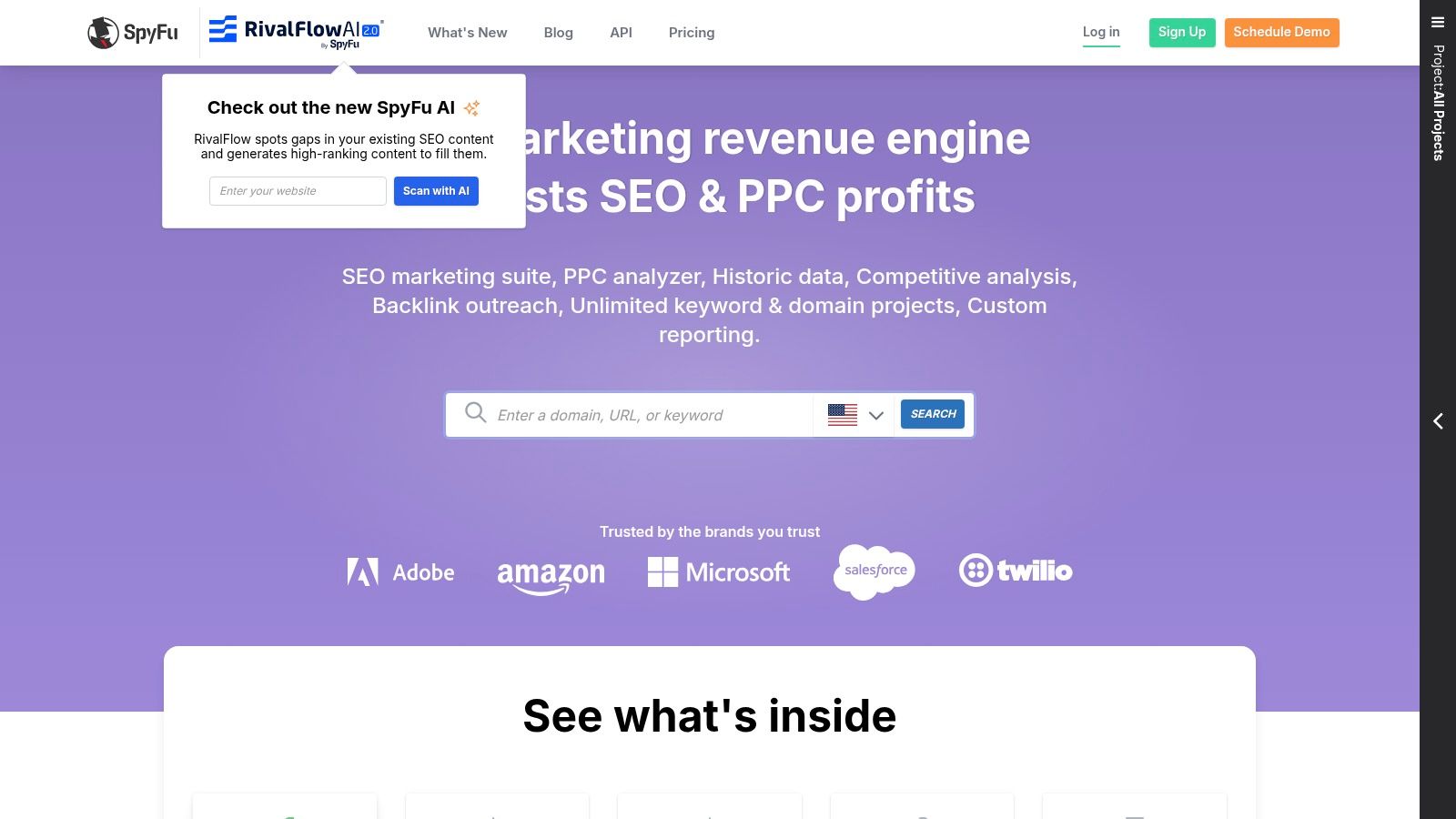
Its core strength lies in its historical data, offering over a decade of insights into Google Ads campaigns. You can type in any domain and instantly see every keyword they've ever bought, every ad they've ever run, and every ranking change they’ve experienced. This makes it an invaluable resource for building a proven keyword list and avoiding the costly mistakes your competitors have already made. For a deeper dive, you can explore some advanced techniques for running a Google Ads competitor analysis on the keywordme blog.
Best Features & Use Cases
- Competitor Keyword Research: Uncover the exact keywords your competitors are bidding on, including their estimated monthly spend and clicks for each term.
- PPC "Kombat" Feature: Directly compare the paid keyword universes of up to three domains to identify keyword gaps and overlaps in your strategies.
- Historical Ad Copy Data: View years of ad variations from your competitors to inspire your own creative and find messaging that resonates in your market. This makes it one of the most powerful PPC keyword research tools for ad copy ideation.
Pro Tip: While SpyFu’s interface can feel data-dense at first, start by focusing on the "Top Keywords" report for a new competitor. This gives you a quick, high-impact list of their most valuable paid terms to analyze and potentially target in your own campaigns.
7. WordStream Free Keyword Tool
WordStream offers a straightforward and accessible entry point into the world of PPC keyword research. Their Free Keyword Tool is designed for speed and simplicity, making it a favorite for small business owners or marketers who need quick ideas without the complexity of a full-fledged SEO suite. Just enter a keyword, choose your industry and location, and you get a list of relevant terms almost instantly.
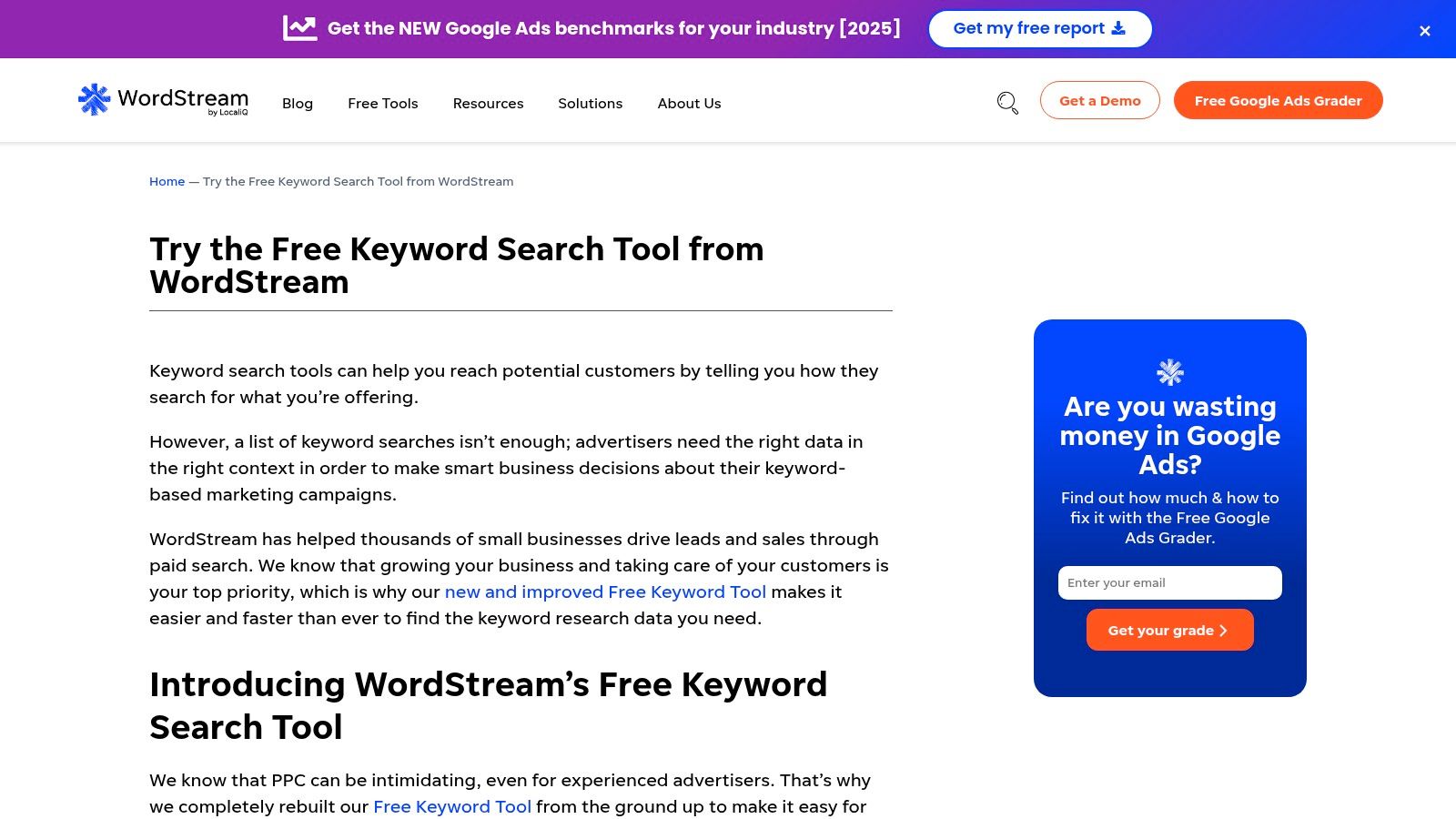
What makes it stand out is its proprietary "Opportunity Score." This metric combines search volume, competition, and cost-per-click (CPC) data to give you a single, at-a-glance rating of a keyword's potential value. This feature helps beginners quickly identify high-impact, low-competition keywords that might otherwise be overlooked. While the initial results are limited, providing an email grants you access to the full list, making it a valuable free resource.
Best Features & Use Cases
- Opportunity Score: Quickly assess keyword potential with a unique metric that simplifies complex data points into a single score.
- Industry and Location Targeting: Refine your keyword search to get more relevant suggestions tailored to your specific market.
- Fast Keyword Ideation: Excellent for quick brainstorming sessions when you need to generate a foundational keyword list for a new campaign without a steep learning curve.
Pro Tip: The tool is fantastic for initial research, but the data is pulled from a cache and might not be as real-time as other platforms. Use it to generate ideas and then validate the most promising terms with a tool like Google Keyword Planner for the latest metrics before launching your campaigns.
8. KeywordTool.io (Keyword Tool Pro)
When you need to go beyond standard keyword suggestions and dive deep into the long-tail, KeywordTool.io is an invaluable resource. This tool taps directly into Google Autocomplete to generate hundreds of highly relevant, long-tail keyword variations for any topic. It’s a goldmine for discovering the exact phrases and questions your audience is typing into search engines, making it one of the most effective PPC keyword research tools for building highly-themed ad groups.
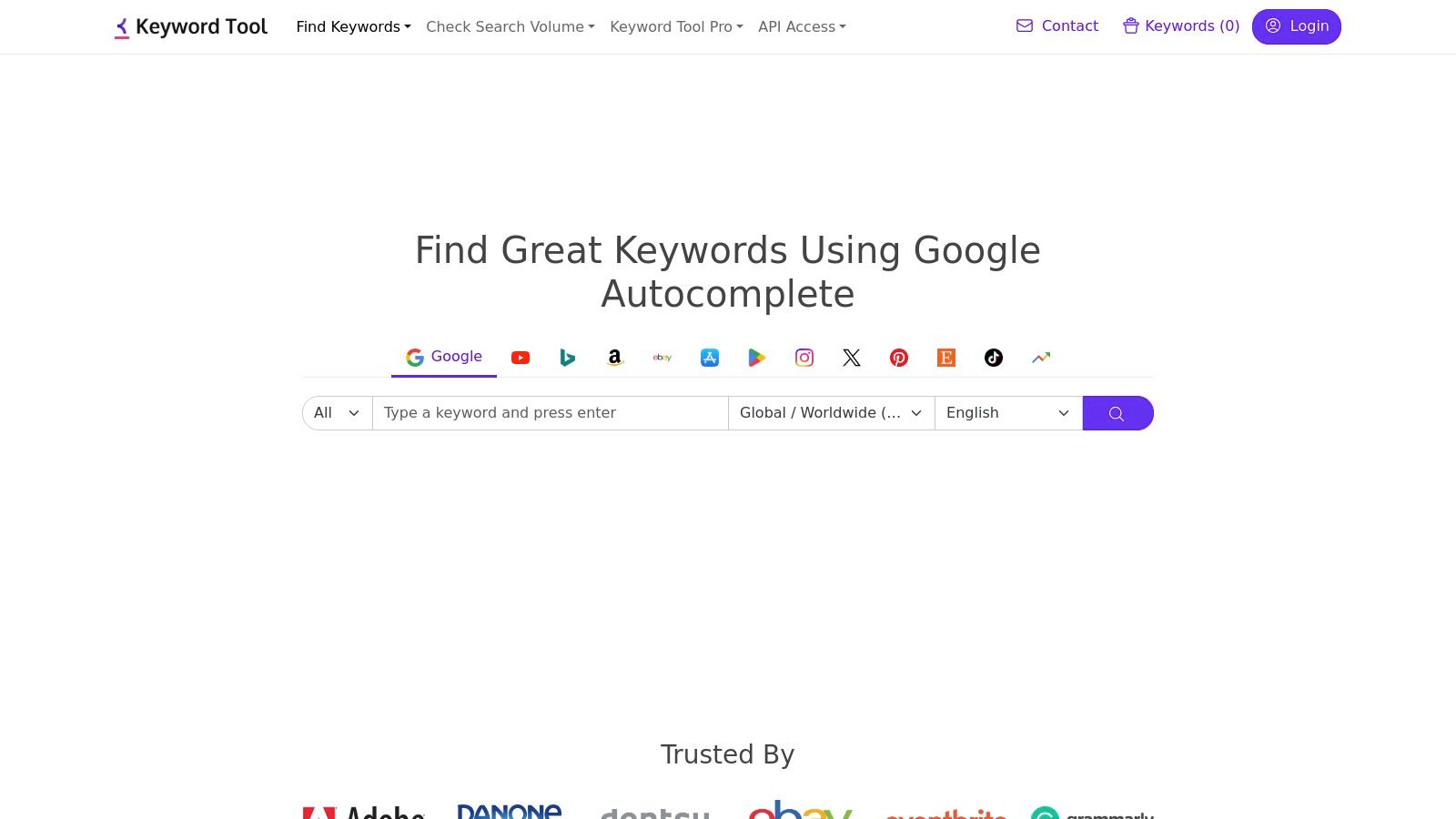
What makes KeywordTool.io unique is its multi-platform approach. You aren't just limited to Google; you can mine keyword suggestions from YouTube, Bing, Amazon, eBay, and even Instagram. This is perfect for advertisers running campaigns across multiple channels who need to understand user search behavior in different ecosystems. The free version is great for initial brainstorming, but unlocking its full potential with search volume, CPC, and competition data requires a Pro subscription.
Best Features & Use Cases
- Google Autocomplete Mining: Generates thousands of long-tail keywords by scraping Google's "suggest" feature, perfect for finding low-competition terms.
- Multi-Platform Support: Uncover keyword ideas and user intent on platforms like YouTube, Amazon, and Bing, not just Google Search.
- Question-Based Keywords: Easily find question-formatted keywords (who, what, where, why) that are ideal for creating targeted ad copy and landing page content.
Pro Tip: Use the "Negative Keywords" feature to quickly identify irrelevant terms that Autocomplete suggests alongside your seed keyword. This helps you build a robust negative list from the very start, preventing wasted ad spend on unqualified clicks.
9. Ubersuggest (by Neil Patel)
Ubersuggest, developed by marketing guru Neil Patel, has become a go-to tool for those who need a blend of SEO and PPC insights without a hefty price tag. It presents keyword data in an incredibly straightforward and visual way, making it less intimidating for beginners or small teams. While it's a strong all-in-one SEO suite, its keyword research capabilities are robust enough to earn it a spot among dedicated PPC keyword research tools.
Its primary appeal lies in its accessibility and affordability. You get a solid range of features, including keyword ideas, search volume, CPC, and paid/organic difficulty scores, all wrapped in a user-friendly interface. This makes it an excellent choice for businesses and freelancers who manage both their paid campaigns and organic search strategy and need a single, cost-effective platform to do so. For those just starting, it provides a gentle learning curve into the world of keyword data.
Best Features & Use Cases
- Keyword Ideas & Data: Generate lists of keyword suggestions from a seed term or competitor domain, complete with volume, CPC, and competition metrics.
- Content Suggestions: Provides content ideas based on top-ranking articles for your target keywords, helping you align landing page copy with user intent.
- Affordable All-in-One Tool: Combines keyword research with other useful features like site audits and rank tracking, offering great value for its price point.
Pro Tip: Ubersuggest offers a lifetime license option, which is almost unheard of in the SaaS world. If you're on a tight budget and foresee needing a tool for the long haul, this one-time payment can offer significant savings compared to recurring monthly subscriptions from competitors.
10. Serpstat
Serpstat positions itself as an all-in-one growth hacking tool, and for good reason. While it offers a full suite of SEO features, its capabilities as a PPC keyword research tool are robust, especially for its price point. It’s an excellent option for agencies and freelancers who need to manage both SEO and PPC workflows without investing in multiple expensive subscriptions. It provides a comprehensive view of the competitive landscape, showing you what keywords your rivals are bidding on and the ads they’re running.
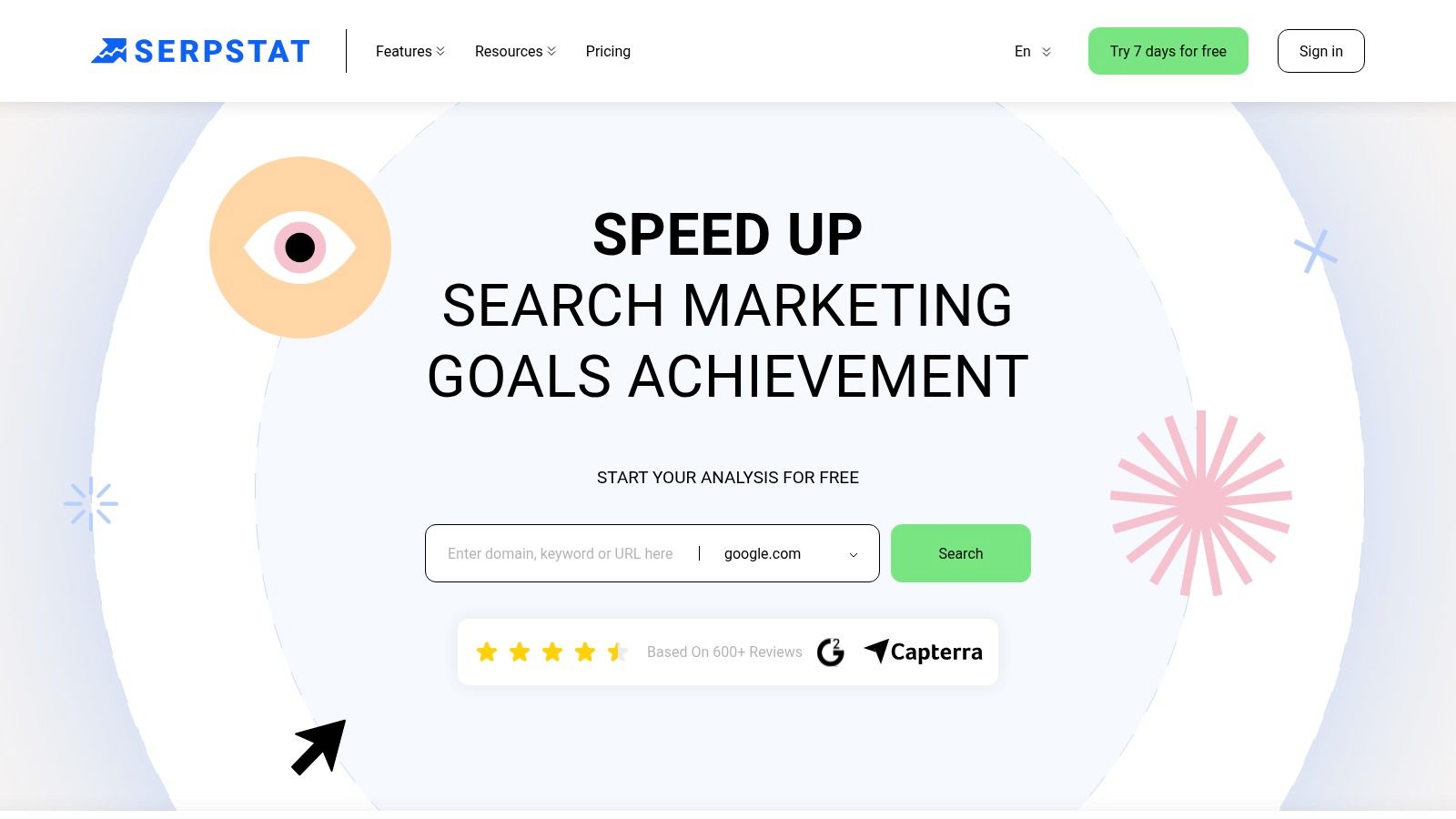
Its biggest draw is value. You get keyword research, competitor ad monitoring, rank tracking, and site audits bundled into one platform. For US agencies, the team management and white-label reporting features on higher-tier plans make it a scalable solution. This integrated approach allows you to find new paid keywords, analyze their organic potential, and track performance for both channels side-by-side, streamlining your entire digital strategy from a single dashboard.
Best Features & Use Cases
- Competitor PPC Analysis: Uncover the exact keywords your competitors are bidding on, view their ad copy, and analyze their campaign strategies.
- Integrated Keyword Research: Find and cluster keywords for both PPC and SEO, seeing data like search volume, CPC, and competition level.
- Rank Tracking: Monitor your paid and organic keyword positions to see how your campaigns are impacting overall search visibility.
- Team & Agency Features: Higher-tier plans include team management, API access, and white-label reports, which is ideal for agencies managing multiple clients.
Pro Tip: Serpstat's entry-level plans have lower daily search quotas. If you're a heavy user or a larger agency, carefully review the limits on each plan to ensure it meets your daily research needs without hitting a cap.
11. SE Ranking
While often celebrated for its SEO capabilities, SE Ranking has evolved into a robust all-in-one marketing platform with powerful features for PPC professionals. It offers a comprehensive suite of competitive and keyword research tools that reveal both paid and organic strategies, making it a highly versatile choice. For SMBs and agencies needing a scalable solution that covers more than just PPC, SE Ranking provides exceptional value and a user-friendly interface.
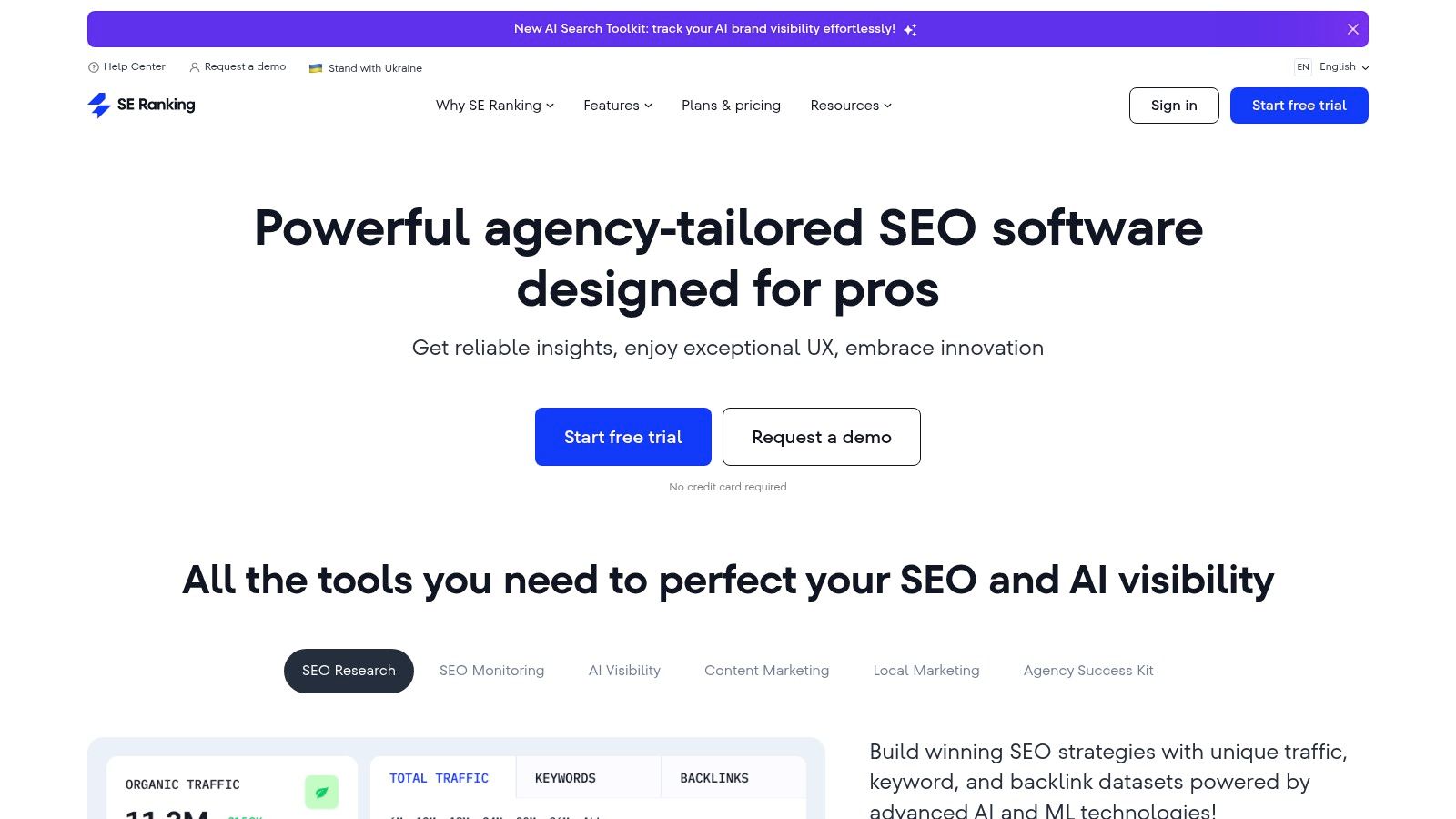
Its strength lies in its holistic view of the search landscape. You can analyze a competitor’s ad copy, see which keywords they're bidding on, and uncover their most profitable campaigns. This data allows you to reverse-engineer successful strategies and find gaps in the market. The platform's transparent pricing and multi-seat options make it easy to scale from a solo freelancer to a full-fledged agency without breaking the bank.
Best Features & Use Cases
- Competitive PPC Research: Uncover your competitors' paid search strategies, including their ad copy, keyword portfolios, and historical ad performance.
- Keyword Research for Ads: Use the keyword research module to find profitable terms, check their CPC, and assess competition levels specifically for paid campaigns.
- SERP Analysis: Go beyond keywords by analyzing the entire SERP to understand who is ranking, what types of ads are shown, and the overall competitive difficulty.
Pro Tip: While SE Ranking's PPC data is solid, its primary strength is SEO. Use it as one of your core PPC keyword research tools for competitor analysis and initial keyword discovery, but cross-reference its CPC and volume data with a dedicated PPC tool like the Google Keyword Planner for maximum accuracy before launching a big campaign.
12. iSpionage
If you want to reverse-engineer your competitors' PPC strategy, iSpionage is your go-to tool. It’s a competitive intelligence platform built from the ground up for paid search advertisers. Rather than just finding general keywords, it gives you a direct look into what your rivals are bidding on, the ad copy they're running, and the landing pages they're using to convert traffic. This makes it an invaluable asset for gaining a competitive edge.
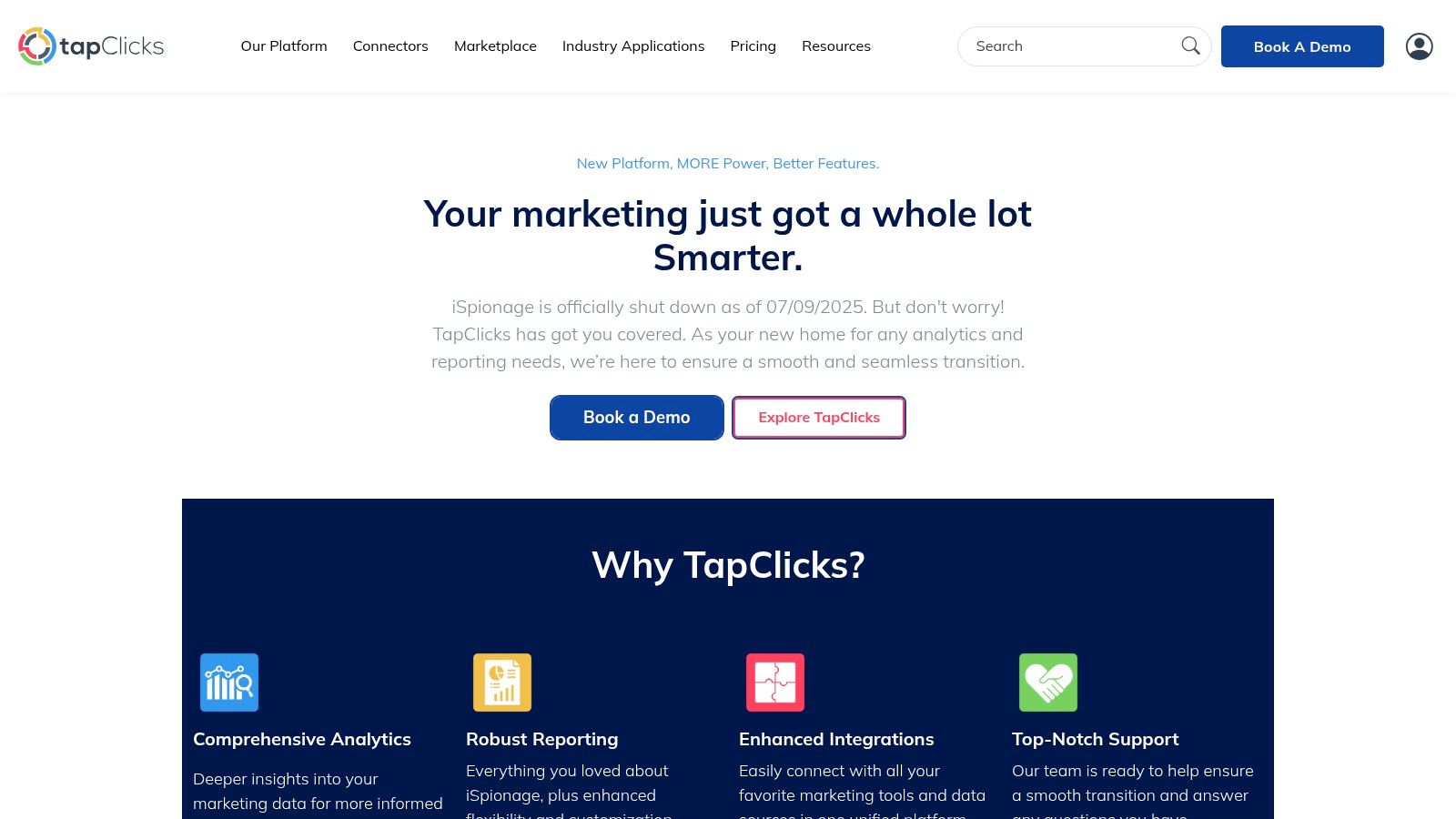
The platform’s strength lies in its full-funnel analysis. You can see the entire user journey your competitors have created, from the keyword trigger to the ad and finally to the landing page. It even provides unique metrics like the "Keyword Effectiveness Index" (KEI) to help you find high-value, low-competition terms your competitors might be overlooking. It’s one of the best PPC keyword research tools for advertisers who are more focused on competitive analysis than blue-sky brainstorming.
Best Features & Use Cases
- Competitor Keyword Analysis: Uncover the exact PPC keywords your competitors are bidding on in Google Ads and see which ones overlap with your strategy.
- Ad Copy & Landing Page Gallery: Get a historical view of competitor ad copy and landing page designs to inspire your own creative A/B tests.
- Campaign Monitoring: Set up real-time alerts to monitor competitors' campaigns, including changes in local markets, so you can react quickly to new strategies.
Pro Tip: Use the landing page gallery not just for inspiration, but to identify gaps in your competitors' funnels. If you see them running ads for a specific service but their landing page is weak, you've found a prime opportunity to outmaneuver them with a better user experience.
Top 12 PPC Keyword Research Tools Comparison
Choosing Your PPC Power Tool
And there you have it, a deep dive into the best PPC keyword research tools on the market today. We've journeyed from the foundational, must-use platforms like Google and Microsoft's Keyword Planners to the all-in-one SEO and PPC powerhouses like Semrush and Ahrefs. We’ve even peeked behind the curtain of your competitors' strategies with spy-centric tools like SpyFu and iSpionage.
It’s clear that the "best" tool is less about a single definitive winner and more about what’s best for your specific situation. A freelance PPC specialist might thrive with a combination of free tools and a budget-friendly option like SE Ranking, while a large agency will likely need the comprehensive, data-rich environment of a top-tier Semrush or Ahrefs plan. The key isn't to have them all, but to build a strategic stack that covers your core needs without overwhelming your budget or workflow.
Your Action Plan: From Research to Results
So, where do you go from here? Staring at a list of twelve amazing platforms can feel like analysis paralysis waiting to happen. Let’s break it down into actionable steps.
First, define your primary need. Are you struggling with initial keyword discovery? A tool like Semrush's Keyword Magic Tool or KeywordTool.io is your best friend. Are you constantly getting outbid and need to understand competitor tactics? SpyFu is your go-to. Is your main goal to find low-cost, high-intent keywords? Start with the foundational data in Google’s own planner.
Next, consider your workflow. The biggest trap with these powerful PPC keyword research tools isn't a lack of data; it's the gap between finding a great keyword and actually implementing it. How many times have you found a list of golden long-tail keywords, only to let them sit in a spreadsheet for weeks? This is where efficiency becomes your competitive advantage.
The smartest approach is often a two-tool strategy: one for deep discovery and another for seamless execution. You can use a comprehensive platform like Ahrefs to uncover opportunities and then use a workflow-focused tool like Keywordme to instantly act on those insights directly within your Google Ads account. This combination gives you the best of both worlds: powerful data and lightning-fast implementation.
Final Thoughts on Finding the Right Fit
Ultimately, the goal of any PPC keyword research tool is to give you leverage. It's about turning raw data into strategic action that drives clicks, conversions, and, most importantly, profit. Don't get bogged down by feature lists. Instead, focus on the outcomes. Which tool will save you the most time? Which one provides insights that you can actually use to make better bidding decisions?
The landscape of PPC is constantly shifting, and having the right intel is non-negotiable. Whether you’re a solo entrepreneur trying to make every dollar count or an agency managing a massive ad spend, the right toolkit will be the foundation of your success. Choose wisely, test relentlessly, and never stop digging for that next keyword that will change the game for your campaign.
Tired of spending hours exporting keywords from your favorite research tool just to manually upload and organize them in Google Ads? Keywordme integrates directly into your Google Ads workflow, allowing you to act on insights from any of these platforms with a single click. Stop the spreadsheet madness and start building more profitable campaigns faster by visiting Keywordme to see how it works.


.svg)